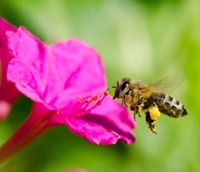
Honeybees’ efforts to locate pollen-rich flowers are being scuppered by diesel exhaust fumes, according to new research. Scientists say the pollution is changing the chemical make-up of flowers’ scent, making it harder for bees to find and recognise them. It is feared could have repercussions for pollination and, ultimately, global food production.
Dr Tracey Newman, a neuroscientist at the University of Southampton, said:
“Diesel exposure alters floral odours and it’s a significant enough change in the chemistry to impact on the honeybee’s ability to recognise that odour.”

The study, published in the Scientific Reports journal, has involved mixing eight chemicals found in oilseed rape flowers with both clean and polluted air. The researchers found that when mixed with the diesel fumes two of the chemicals disappear completely within a minute, with the other six all decreasing in volume.
The proportion of bees able to recognise the synthetic scent when the diesel-effected chemicals have been removed is also cut significantly, the researchers say.
The findings have prompted Friends of the Earth campaigner Paul de Zylva to urge the Government to draft a “Bee Action Plan” to counter the threats faced by the insects.





